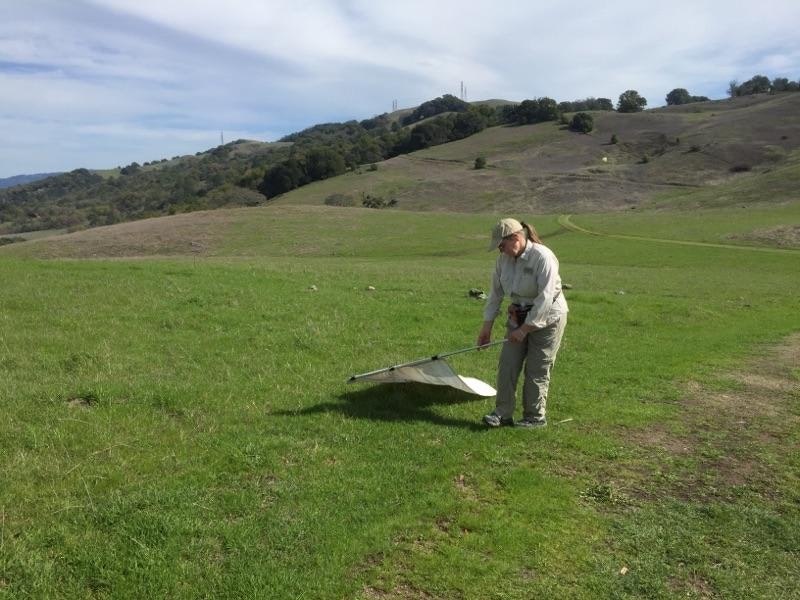On the hunt for vector-borne diseases
Tick & Tick-borne Disease Surveillance Program

February 2020 -Throughout the year, District laboratory staff collect ticks of different species and life stages from trails in state, regional, and local parks and recreation areas around Marin and Sonoma counties. Ticks are collected by dragging a one meter square flannel flag on the ground and in the vegetation along trails. Collected specimens are identified and separated by species, sex, and life stage to be tested for pathogens when appropriate. The three main species collected by the District are Dermacentor occidentalis (the Pacific Coast tick), Dermacentor variabilis (the American dog tick) and Ixodes pacificus (the western black-legged tick). Ixodes pacificus is the common tick species in the area that can transmit the bacterium Borrelia burgdorferi, which causes Lyme disease. Adults and nymphs of this species are tested for this pathogen, as well as Borrelia miyamotoi, which is a bacteria that causes a relapsing fever-type illness. To date, no human cases of B. miyamotoi have been reported in California, but the bacteria has been found in Ixodes pacificus ticks throughout the state, including in Marin and Sonoma counties. Dermacentor species ticks can be tested for other pathogens in conjunction with the California Department of Public Health.
Arbovirus Surveillance Program

The District maintains a multifaceted surveillance program for arboviruses, including West Nile virus (WNv), St. Louis encephalitis virus (SLEv) and western equine encephalitis virus (WEEv). The District utilizes both active and passive monitoring techniques (defined below) to detect and quantify the density of mosquito populations and the intensity of virus transmission in the region. This information is used to predict areas of elevated disease risk and direct critical vector control interventions to effectively and efficiently protect human health. Since 2014, the District has conducted enhanced surveillance efforts to detect invasive Aedes mosquito species. In addition to larval and adult surveillance for the invasive Aedes aegypti and Aedes albopictus, the District also investigates travel-related cases of chikungunya, dengue, and Zika viruses. All traps set around cases are checked for the presence of Aedes adult mosquitoes. All Culex adult mosquitoes collected in these areas are tested for all three viruses. There is no evidence that local Culex species can transmit these viruses. As of 2019, no invasive Aedes mosquitoes have been identified in Marin or Sonoma counties.
